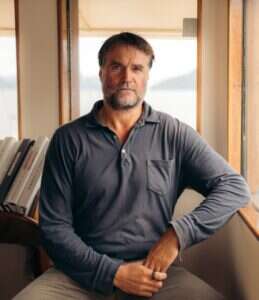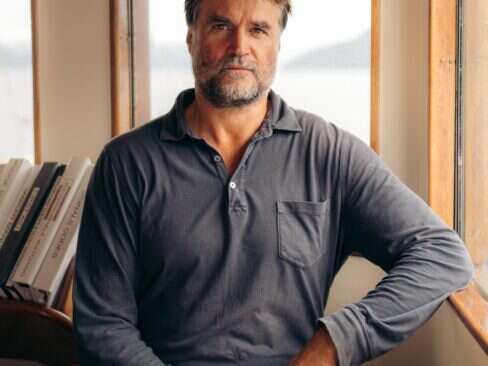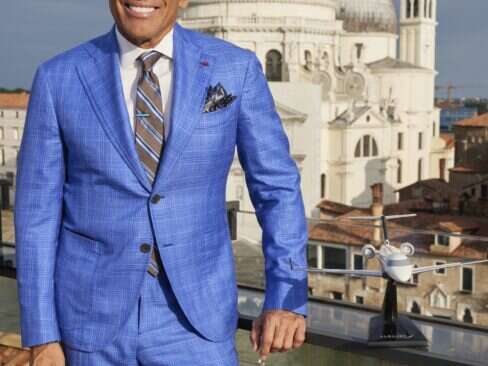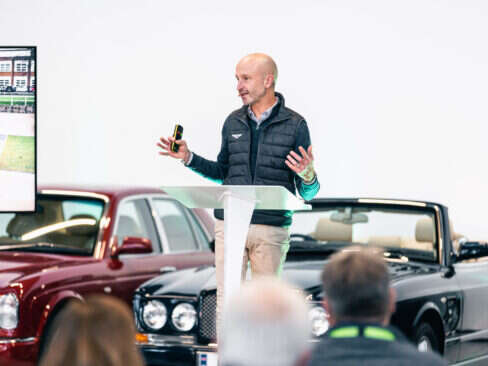
Co-FounderAteliers deMonaco
Robert van Pappelendam, born 1969, is co-founder of Ateliers deMonaco. After having finalized his law study at the Erasmus University, he changed course and started a marketing career in various categories, his last position as a marketing director of a US$12+ billion turnover beauty/care business unit. He worked in different brand building assignments located in Rotterdam, Brussels, Cincinnati, Geneva and Singapore. Since 2002 he has been active in the board of advisors of Frederique Constant SA, Geneva. Recently, he answered questions via email with Elite Traveler President and Editor-in-Chief, Doug Gollan, about his new project, Ateliers deMonaco, a new entry into fine watchmaking.
ET: Tell us a little about Ateliers deMonaco and what type of watches you will be making.
Robert van Pappelendam: Ateliers deMonaco is a new watch company that creates timepieces inspired by, designed for and made in Monaco. As a reflection of the scenery, lifestyle and people that reside in Monaco, we want to make bespoke and unique pieces of art that capture this ability to enjoy and live life to the fullest. We look for the contradictions that made Monaco what it is today. To convey this in a timepiece, we will maximally exploit the opportunities offered by modern technology and contrast this with the craftsmanship of haute horlogerie. A great example of this ambition is our Grand Tourbillon Xtreme Precision—one of the most precise tourbillon movements in the world that requires over 120 man hours of meticulous hand finishing.
ET: Why another watch company?
Robert van Pappelendam: It does not happen that often in your life that you are able to realize a dream, and for us this is the reason why we started this project: a high-end watch brand, by ourselves, for ourselves. And in a market where manufacturers tumble over each other to claim who has a longer heritage, we wanted a proposition designed for our generation that lives now—a hybrid between the best of modern technology and traditional craftsmanship. It’s akin to how nouvelle cuisine, in culinary terms, was trying to set a new standard and fresh impulse in cooking trends, so are we trying to give a fresh impulse to haute horlogerie; we call it “nouvelle horlogerie,” from Monaco. If we now look—after so much blood, sweat and even tears—at our end-product, at least our hearts start beating faster, and that in the end is why we started in the first place!
ET: You have two partners. Can you tell us a bit about them—I understand you are all Dutch?
Robert van Pappelendam: I had the pleasure and luck of having met two extraordinary persons that have become my friends during this project. Firstly, Pim Koeslag—master horloger and an unbelievably talented and gifted watchmaker. At an age south of 30, he is the mastermind behind our extreme precision and patented tourbillon movement. I would echo the words of Franck Muller and Gerald Genta on Pim: “If you are capable of making such masterpieces before you turn 30, the future will be bright, exciting and we can hardly wait to see what is next.” Secondly, I met Peter [Stas] eight years ago. Although we had studied in the same city in the Netherlands, our paths only crossed later in our lives in Geneva. By that time, Peter and his wife Aletta had built a formidable Geneva-based watch company, Frederique Constant, with their head office between well-established brand names like Rolex, Patek Philippe and Vacheron Constantin on the outskirts of Geneva. The business consistently beats growth targets of their competitors. I could not have wished for better mentors than the two of them! The fact that we are all Dutch is more a coincidence than a deliberate choice. I would compare it with the odds of winning the lottery.
ET: Where would you like to see the brand in say five years?
Robert van Pappelendam: We have the clear intention to make this into a long term success, and developing a brand is not a sprint but a carefully orchestrated marathon. We want our experiences to seduce people into a moment of indulgence for themselves, a statement to others and a degree of distraction from reality—a skill that unfortunately we often lose while growing up. We want bespoke, which is why we only make 18 pieces of our watches and then move on to the next endeavor in our collection. So we don’t have lofty sales goals where we want the brand to be in five years, yet instead we have strict quality and customer satisfaction targets: Every person owning an Ateliers deMonaco watch knows he bought something substantial for generations to come.
ET: You’re based in Monaco. Where are the watches made and why Monaco?
Robert van Pappelendam: As we wanted a proposition that was not copying the category conventions of the past decades, we took the liberty of casting our net wide and situating ourselves in a place that covers the inspiration and aspiration that we had in mind for our brand: Monaco and its surroundings. This place is not only an attraction for us, but has a long standing heritage of attracting some of the great innovators: painters like Picasso, Chagall, Matisse (or more recently like the Dutch sculptor Verkade); architects like Le Corbusier; poets and writers like Checkhof and Cocteau; and philosophers like Nietzsche. And more important, these people did not only reside in this area, but delivered some of their best work while in the region. Of course, the breathtaking scenery of the Mediterranean against the startling rock formation of the Alps, and the warm blanket of the climate makes the combination picture perfect! For all the individual components we work with the very best out of the industry, which means a lot comes from Switzerland, but all is designed and finally manufactured right in the heart of Monaco. So we are proud to wear the signage: Made in Monaco!
ET: Will you be selling worldwide, and if so where?
Robert van Pappelendam: We have no intention or desire to be sold in a wide range of distribution points. Instead, we will turn down offers aimed at quantity while engaging in proposals about ultimate bespoke quality and the ability to delight our target customer. We have final agreements with five points of sale, and we believe over time this could go up to 25. Having said that, we are not in a hurry as our current outlets already create enough global reach that scaling up needs to be carefully managed.
ET: Who do you expect your customer will be?
Robert van Pappelendam: Although it is always tempting to name-drop those people that wear our watches, when you buy an Ateliers deMonaco you also get our devotion to customer satisfaction and discretion to honor and protect your private lives. However, we clearly see a certain more general profile: all of them have been the driving force of some kind of significant success story, they have no desire to hide behind iconic brands of the past, and they appreciate bespoke propositions that fit their unique needs. They clearly accept the social responsibility that comes with the success, and want to give back to the society that gave them the opportunity to succeed.
ET: What will be the price points and production quantity?
Robert van Pappelendam: Price points are Euro 88K for the Ronde d’Or and Euro 98K for the Carré d’Or. Depending on bespoke finishing and tailored complications, prices can go up to whatever is needed to satisfy the needs of our customer. All our watches are hand numbered and either made in limited editions of a maximum of 18 or are complete unique and bespoke pieces. Our aim is to make 25 to 40 watches a year in total, which will keep us busy enough for a while.
ET: How does your background with consumer goods companies translate into an artisan watchmaking enterprise?
Robert van Pappelendam: Never in life is just one experience enough to help you succeed in any venture. So, if you have spent your career pleasing the masses, it is refreshing to delight just a few with full dedication, and not worry about anybody else. For sure being trained in mass marketing helps you understand what it takes to build brands in highly competitive and often commoditized markets. But it does not help you in building an appreciation for craftsmanship, developing an eye for detail and an understanding that pleasing one customer is more important than being an acceptable compromise for 10.
ET: Will you be using any consumer goods practices such as free samples or maybe coupons (asked with humor)?
Robert van Pappelendam: If you negotiate hard enough, you might seduce me into a buy three get one free…..!
ET: Is there anything your former colleagues at a huge multi-national company can learn from a small start-up enterprise such as Ateliers deMonaco?
Robert van Pappelendam: The beauty of multi-nationals is also its biggest weakness: They are so big that they rely heavily on systems and processes to ensure they don’t derail. This structure can become the religion and end-deliverable for the business itself, i.e people doing things to manage the system versus winning outside in the marketplace they compete in. The top watch-outs for the big guys are: First, understand your reason for being. Big companies tend to take their existence for granted as they have been around for a while. This sharply reduces external focus, and the ability to be able to spot a trend or have the agility to adopt to new market realities. Smaller companies are constantly reminded that if they can justify their reason for being, they have a chance to succeed. Second, embrace risk. Risk is a dirty word in big companies, as the outcome of taking a risk is unpredictable and importantly has often more downside than upside. Reward systems are set up accordingly. However, progress is only achieved by treading into the unknown, in which taking risk is potentially rewarded with first-mover advantage, a point of difference that comes with a huge financial return. And third, keep a scarcity mentality. This is one of the key reasons why the cost of doing business in big companies always creeps upwards, and the rigor of small companies better reflects that every dollar spent needs to help the cause, or should not be spent.
ET: When you aren’t working, do you have any passions or hobbies?
Robert van Pappelendam: Maybe not unfamiliar to some, I have a high energy level, short concentration span and a beyond normal passion and commitment for my work. However, all those shortcomings aside, I love to be home and cook, eat, drink. And my wife would add that I am addicted to buying art, but like most addicts, I am still in denial.
ET: Any favorite vacation spots or hotels from all your travels?
Robert van Pappelendam: It would be too easy to just name a few exotic places where the livin’ is easy. So let me highlight one city that continues to amaze me: Shanghai—soon to be the global metropolis where trends start, careers begin and millions of hopefuls will come to pursue their dreams. It’s an area of 40 million people that seems to reinvent itself every 24 hours.












